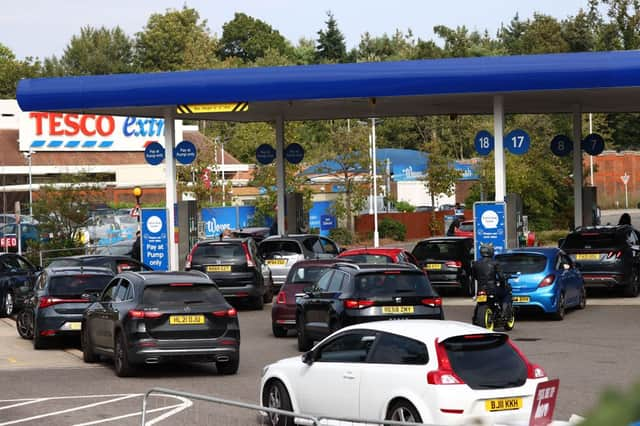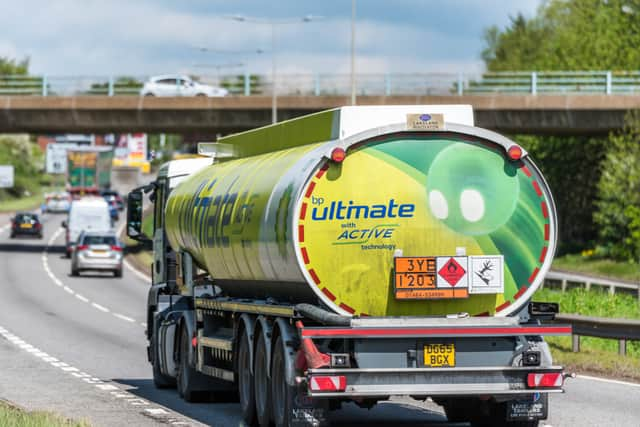Using the army won’t solve fuel crisis, warns industry body


Drafting in the military to deliver fuel to filling stations will not be enough to end the current fuel crisis on its own, petrol retailers have warned.
The Petrol Retailers Association (PRA) said there was no “single lever” that could be pulled to alleviate the current problems of shortages at some filling stations and urged drivers to stop buying more fuel than they need.
Advertisement
Hide AdAdvertisement
Hide AdPrime Minister Boris Johnson is thought to be considering using army troops to drive fuel tankers in order to address driver shortages which are causing supply issues.
PRA chairman Brian Madderson, confirmed that some training for military personnel had been taking place but said the move was not an “absolute panacea”.
He said that getting tankers from point to point was only part of the equation, as drivers also have to fill the tankers at supply depots, which requires particular skills.
He told BBC Radio 4’s Today programme: “There has been training going on in the background for military personnel. But that’s perhaps just confined to moving the tanker by articulated truck from point A to point B.
Advertisement
Hide AdAdvertisement
Hide Ad“One of the difficulties is loading, and the tanker drivers currently load their own tanks at the gantry at the terminals, and then most are providing the delivery to the forecourt.
“This is a skilled job and we will be working with Government and industry to see how we can best move it forward.”
Mr Madderson added that ongoing delays at the Driver and Vehicle Licensing Agency were believed to be contributing to the shortage of drivers. He told the BBC: “We understand there are as many as 40,000 HGV driver applications sitting on the desks in Swansea waiting to be processed. Now that is just ridiculous, and is just one of many issues that have arisen to create the driver shortage we have today.
“We heard yesterday at the Government meeting that some of the hauliers are desperate to have their drivers go back on the road, but because of the strict medical requirements they have had to submit details to Swansea and there’s a lack of process.”
Advertisement
Hide AdAdvertisement
Hide AdMr Madderson said that while there were many factors to the current situation, drivers could help by acting responsibly. He commented: “If they start buying in their normal quantities, £20 worth, 20 litres to fill up every week, we could see by the end of this week some return to normality – it won’t be perfect, but some return.”
His comments were echoed by Elizabeth de Jong, policy director at trade association Logistics UK, who said: “We are seeing the impact of panic buying. We have been assured through the Petrol Retailers Association and some of the larger petrol companies in the country that there is enough fuel for everyone, but yet [people] have become very concerned and are buying and buying and have caused a very big problem.
“If we go back to our normal amounts and almost relax our behaviour and bring it back to normal then that can calm down quite quickly.”


The GMB union said that plans to grant more than 10,000 temporary visas to foreign lorry drivers would also not be enough on their own to alleviate the supply shortage at filling stations or the wider market.
Advertisement
Hide AdAdvertisement
Hide AdThe union’s general secretary Gary Smith said: “I am not convinced that just issuing loads of visas is going to address the problem. We have got a short-term crisis, we are going to have to come together and find solutions for that.
“But there has to be an honest conversation about a country that’s mired in low pay and insecure work. We are paying for years of driving down pay and conditions.”
His view was supported by truckers’ representatives from Europe, who suggested short-term visa were a “dead end”.
Edwin Atema from the Dutch FNV union, which represents drivers across Europe, told the Today programme: “I think the EU workers we speak to will not go to the UK for a short-term visa to help UK out of the s*** they created themselves.”
Comment Guidelines
National World encourages reader discussion on our stories. User feedback, insights and back-and-forth exchanges add a rich layer of context to reporting. Please review our Community Guidelines before commenting.
